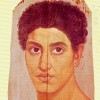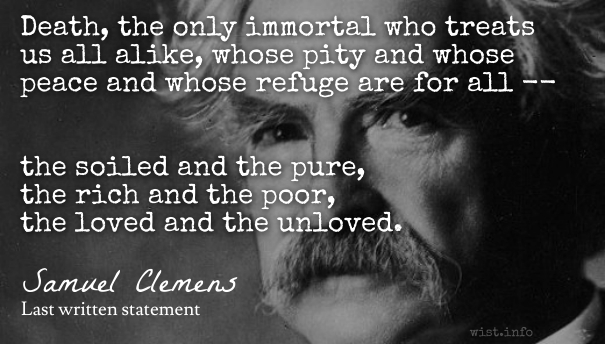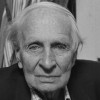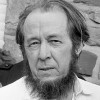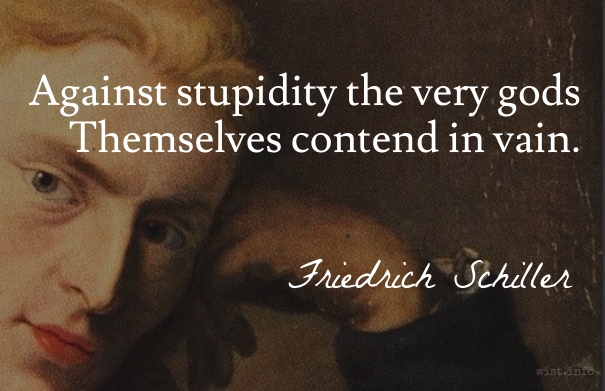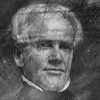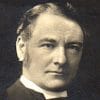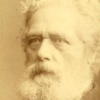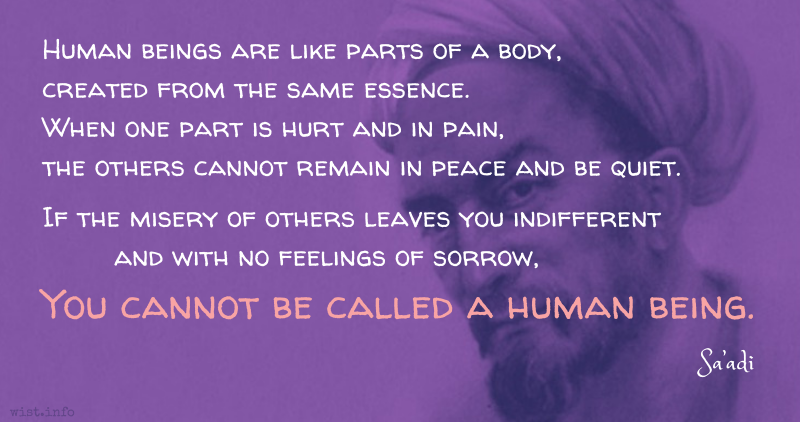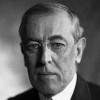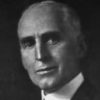The necessity of establishing some form of government [is] to supply the defect of moral virtue.
Thomas Paine (1737-1809) American political philosopher and writer
Common Sense, “On the Origin and Design of Government in General” (14 Feb 1776)
Full text.
Quotations about:
humanity
Note not all quotations have been tagged, so Search may find additional quotes on this topic.
For as man is the best of the animals when perfected, so he is the worst of all when sundered from law and justice. For unrighteousness is most pernicious when possessed of weapons, and man is born possessing weapons for the use of wisdom and virtue, which it is possible to employ entirely for the opposite ends. Hence when devoid of virtue man is the most unholy and savage of animals, and the worst in regard to sexual indulgence and gluttony.
Aristotle (384-322 BC) Greek philosopher
Politics [Πολιτικά], Book 1, ch. 2 / 1253a.31 [tr. Rackham (1932)]
(Source)
Alternate translations:
For man is an animal which, just as it is when fully perfected the best of all, so when separated from law and justice, is the worst of all. For injustice is most difficult to cope with when armed. Man is born into the world in the possession of arms, in the shape of practical wisdom and moral excellence, which he can use to the fullest degree for exactly contrary objects; when destitute of virtue, he is an animal most unholy and most savage, and most viciously disposed toward sensuality and gluttony.
[tr. Bolland (1877)]
For man, when perfected, is the best of animals, but, when separated from law and justice, he is the worst of all; since armed injustice is the more dangerous, and he is equipped at birth with arms, meant to be used by intelligence and virtue, which he may use for the worst ends. Wherefore, if he have not virtue, he is the most unholy and the most savage of animals, and the most full of lust and gluttony.
[tr. Jowett (1885)]
For as by the completion of it man is the most excellent of all living beings, so without law and justice he would be the worst of all, for nothing is so difficult to subdue as injustice in arms: but these arms man is born with, namely, prudence and valour, which he may apply to the most opposite purposes, for he who abuses them will be the most wicked, the most cruel, the most lustful, and most gluttonous being imaginable.
[tr. Ellis (1912)]
For just as man is the best of animals when completed, when separated from law and adjudication he is the worst of all. For injustice is harshest when it is furnished with arms, and man is born naturally possessing arms for prudence and virtue which nevertheless are very susceptible to being used for their opposites. That is why, without virtue, he is the most unholy and the most savage of animals, and the worst with regard to sex and food.
[tr. Lord (1984)]
You read something which you thought only happened to you, and you discover that it happened 100 years ago to Dostoyevsky. This is a very great liberation for the suffering, struggling person, who always thinks that he is alone. This is why art is important. Art would not be important if life were not important, and life is important.
James Baldwin (1924-1987) American novelist, playwright, activist
“An interview with James Baldwin” by Studs Terkel (1961), in Conversations With James Baldwin (1989)
(Source)
Baldwin revisited this theme multiple times.
You think your pain and your heartbreak are unprecedented in the history of the world, but then you read. It was Dostoevsky and Dickens who taught me that the things that tormented me most were the very things that connected me with all the people who were alive, or who had ever been alive. Only if we face these open wounds in ourselves can we understand them in other people. An artist is a sort of emotional or spiritual historian.
[Interview with Jane Howard, Life Magazine (24 May 1963)]
You think your pain and your heartbreak are unprecedented in the history of the world, but then you read. It was books that taught me that the things that tormented me most were the very things that connected me with all the people who were alive, or who had ever been alive.
["James Baldwin Recalls His Childhood," quoting from a television program, New York Times (31 May 1964)]
From these things therefore it is clear that the city-state is a natural growth, and that man is by nature a political animal, and a man that is by nature and not merely by fortune citiless is either low in the scale of humanity or above it, like the “clanless, lawless, hearthless” man reviled by Homer, for one by nature unsocial is also ‘a lover of war’ inasmuch as he is solitary, like an isolated piece at draughts.
[ἐκ τούτων οὖν φανερὸν ὅτι τῶν φύσει ἡ πόλις ἐστί, καὶ ὅτι ὁ ἄνθρωπος φύσει πολιτικὸν ζῷον, καὶ ὁ ἄπολις διὰ φύσιν καὶ οὐ διὰ τύχην ἤτοι φαῦλός ἐστιν, ἢ κρείττων ἢ ἄνθρωπος: ὥσπερ καὶ ὁ ὑφ᾽ Ὁμήρου λοιδορηθεὶς “ἀφρήτωρ ἀθέμιστος ἀνέστιος:” ἅμα γὰρ φύσει τοιοῦτος καὶ πολέμου ἐπιθυμητής, ἅτε περ ἄζυξ ὢν ὥσπερ ἐν πεττοῖς.]
Aristotle (384-322 BC) Greek philosopher
Politics [Πολιτικά], Book 1, ch. 2 / 1253a.2 [tr. Rackham (1932)]
(Source)
See Homer. Original Greek. Alternate translations:
From these considerations, therefore, it is clear that the State is one of Nature's productions, and that man is by nature a social animal, and that a man who is without a country through natural taste and not misfortune is certainly degraded (or else a being superior to man), like that man reviled by Homer as clanless, lawless, homeless. For he is naturally of this character and desirous of war, since he has no ties, like an exposed piece in the game of backgammon.
[tr. Bolland (1877)]
Hence it is evident that the state is a creation of nature, and that man is by nature a political animal. And he who by nature and not by mere accident is without a state, is either a bad man or above humanity; he is like the "tribeless, lawless, hearthless one," whom Homer denounces -- the natural outcast is forthwith a lover of war; he may be compared to an isolated piece at draughts.
[tr. Jowett (1885)]
Hence it is evident that a city is a natural production, and that man is naturally a political animal, and that whosoever is naturally and not accidentally unfit for society, must be either inferior or superior to man: thus the man in Homer, who is reviled for being "without society, without law, without family." Such a one must naturally be of a quarrelsome disposition, and as solitary as the birds.
[tr. Ellis (1912)]
From these things it is evident, then, that the city belongs among the things that exist by nature, and that man is by nature a political animal. He who is without a city through nature rather than chance is either a mean sort or superior to man; he is "without clan, without law, without hearth," like the person reproved by Homer; for the one who is such by nature has by this fact a desire for war, as if he were an isolated piece in a game of backgammon.
[tr. Lord (1984)]
An honest God’s the noblest work of man.
Samuel Butler (1835-1902) English novelist, satirist, scholar
Further Extracts from the Note-Books of Samuel Butler, ch. 1 (1934)
See Pope.
I am human, I consider nothing human is alien to me.
[Homo sum: humani nil a me alienum puto.]
Terence (186?-159 BC) African-Roman dramatist [Publius Terentius Afer]
Heauton Timoroumenos [The Self-Tormentor], l. 77
Alt. trans.:
- "I am human [being], I consider nothing human to be alien to me."
- "I am a human being, so there is nothing human I do not feel to be my concern."
- "I am a human being; nothing human is alien to me."
Death, the only immortal who treats us all alike, whose pity and whose peace and whose refuge are for all — the soiled and the pure, the rich and the poor, the loved and the unloved.
Mark Twain (1835-1910) American writer [pseud. of Samuel Clemens]
Last written note
(Source)
Recorded by A. Paine (his literary executor), Mark Twain: A Biography, Vol III, Part 2, ch. 293 (1912).
The writer is delegated to declare and to celebrate man’s proven capacity for greatness of heart and spirit — for gallantry in defeat — for courage, compassion and love. In the endless war against weakness and despair, these are the bright rally-flags of hope and of emulation. I hold that a writer who does not passionately believe in the perfectibility of man, has no dedication nor any membership in literature.
John Steinbeck (1902-1968) American writer
Speech, Nobel Prize Banquet, Stockholm (10 Dec 1962)
(Source)
Man is the religious animal. He is the only religious animal. He is the only animal that has the True Religion — several of them. He is the only animal that loves his neighbor as himself and cuts his throat, if his theology isn’t straight. He has made a graveyard of the globe in trying his honest best to smooth his brother’s path to happiness and heaven.
Perhaps travel cannot prevent bigotry, but by demonstrating that all peoples cry, laugh, eat, worry, and die, it can introduce the idea that if we try and understand each other, we may even become friends.
Maya Angelou (1928-2014) American poet, memoirist, activist [b. Marguerite Ann Johnson]
Wouldn’t Take Nothing for My Journey Now, ch. 2 “Passports to Understanding” (1993)
(Source)
Most of the members of the convent were old-fashioned Satanists, like their parents and grandparents before them. They’d been brought up to it and weren’t, when you got right down to it, particularly evil. Human beings mostly aren’t. They just get carried away by new ideas, like dressing up in jackboots and shooting people, or dressing up in white sheets and lynching people, or dressing up in tie-dye jeans and playing guitars at people. Offer people a new creed with a costume and their hearts and minds will follow.
Terry Pratchett (1948-2015) English author
Good Omens, 2. “Eleven Years Ago” (1990) [with Neil Gaiman]
(Source)
It may help to understand human affairs to be clear that most of the great triumphs and tragedies of history are caused, not by people being fundamentally good or fundamentally bad, but by people being fundamentally people.
Terry Pratchett (1948-2015) English author
Good Omens, 2. “Eleven Years Ago” (1990) [with Neil Gaiman]
(Source)
Your race, in its poverty, has unquestionably one really effective weapon — laughter. Power, Money, Persuasion, Supplication, Persecution — these can lift at a colossal humbug, — push it a little — crowd it a little — weaken it a little, century by century: but only Laughter can blow it to rags and atoms at a blast. Against the assault of Laughter nothing can stand. You are always fussing and fighting with your other weapons. Do you ever use that one? No; you leave it lying rusting. As a race, do you ever use it at all? No; you lack sense and the courage.
Mark Twain (1835-1910) American writer [pseud. of Samuel Clemens]
“The Chronicle of Young Satan” (c.1897–1900, unfinished)
(Source)
Often paraphrased: "The human race has one really effective weapon, and that is laughter." This is an excised passage from what was eventually posthumously published as No. 44, The Mysterious Stranger (1916).
Indeed, justice is conscience, not a personal conscience but the conscience of the whole of humanity. Those who clearly recognize the voice of their own conscience usually recognize also the voice of justice.
It is far more important to love your wife than to love God, and I will tell you why. You cannot help him, but you can help her. You can fill her life with the perfume of perpetual joy. It is far more important that you love your children than that you love Jesus Christ. And why? If he is God you cannot help him, but you can plant a little flower of happiness in every footstep of the child, from the cradle until you die in that child’s arms. Let me tell you to-day it is far more important to build a home than to erect a church. The holiest temple beneath the stars is a home that love has built. And the holiest altar in all the wide world is the fireside around which gather father and mother and the sweet babes.
NARRATOR: The tools of conquest do not necessarily come with bombs and explosions and fallout. There are weapons that are simply thoughts, attitudes, prejudices — to be found in the minds of men. For the record, prejudices can kill and suspicion can destroy, and a thoughtless, frightened search for a scapegoat has a fallout all its own — for the children and the children yet unborn. And the pity of it is that these things cannot be confined to … the Twilight Zone.
All animals, except man, know that the principal business of life is to enjoy it.
Samuel Butler (1835-1902) English novelist, satirist, scholar
The Way of All Flesh, ch. 19 (1903)
Full text.
Humanity has advanced, when it has advanced, not because it has been sober, responsible and cautious, but because it has been playful, rebellious, and immature.
Against stupidity the very gods
Themselves contend in vain.[Mit der Dummheit kämpfen Götter selbst vergebens]
Friedrich Schiller (1759-1805) German poet, playwright, critic [Johann Christoph Friedrich von Schiller]
The Maid of Orleans [Die Jungfrau von Orleans], Act III, sc. vi (1801) [tr. Swanwick]
Alt. trans:
- "Against stupidity the gods themselves contend in vain."
- "Against stupidity the gods themselves labor in vain."
- "Against stupidity the gods themselves fight unvictorious."
- "Against stupidity even the gods contend in vain."
- "With stupidity the gods themselves contend in vain."
- "With stupidity the gods themselves struggle in vain."
To complain of the age we live in, to murmur at the present possessors of power, to lament for the past, to conceive extravagant hopes of the future, are the common dispositions of the greatest part of mankind.
I never met a man I didn’t like.
Will Rogers (1879-1935) American humorist
Motto
(Source)
Rogers' first use of the phrase in writing comes from "Letters of a Self-Made Diplomat to His President," Saturday Evening Post (1926-11-06):
I bet you if I had met him and had a chat with him, I would have found him a very interesting and human fellow, for I never yet met a man that I dident like. When you meet people, no matter what opinion you might have formed about them beforehand, why, after you meet them and see their angle and their personality, why, you can see a lot of good in all of them.
(Misspelling of "didn't" in the original.) Rogers was writing of his regrets over not having met Leon Trotsky while visiting the Soviet Union. The article was incorporated into a book Rogers published about the trip, "There's Not a Bathing Suit in Russia & Other Bare Facts, ch. 4 (1927).
Two other early references, the first from his "Weekly Article" column (1930-06-29):
You know I have often said in answer to inquiries as to how I got away with kidding some of our public men, that it was because I liked all of them personally, and that if there was no malice in your heart there could be none in your "Gags," and I have always said I never met a man I didn't like.
And from a speech at a Boston church, the same month:
I’ve got my epitaph all worked out. When I’m tucked away in the old graveyard west of Oologah [Oklahoma], I hope they will cut this epitaph -- or whatever you call them signs they put over gravestones -- on it, 'Here lies Will Rogers. He joked about every prominent man in his time, but he never met a man he didn’t like.'
That reference was picked up in AP news stories, and Rogers used the phrase for the rest of his life.
More info on Rogers' motto and the above quotations: here, here, and here.
I have spent all my life under a communist regime and I will tell you that a society without any objective legal scale is a terrible one indeed. But a society with no other scale but the legal one is not quite worthy of man either. A society which is based on the letter of the law and never reaches any higher is taking very scarce advantage of the high level of human possibilities. The letter of the law is too cold and formal to have a beneficial influence on society. Whenever the tissue of life is woven of legalistic relations, there is an atmosphere of moral mediocrity, paralyzing man’s noblest impulses.
Alexander Solzhenitsen (1918-2008) Russian novelist, emigre [Aleksandr Isayevich Solzhenitsyn]
“A World Split Apart,” Commencement Address, Harvard (8 Jun 1978)
(Source)
Many times a day I realize how much my own outer and inner life is built upon the labors of my fellow men, both living and dead, and how earnestly I must exert myself in order to give in return as much as I have received. My peace of mind is often troubled by the depressing sense that I have borrowed too heavily from the work of other men.
Albert Einstein (1879-1955) German-American physicist
“What I Believe,” Forum and Century (Oct 1930)
(Source)
Einstein crafted and recrafted his credo multiple times in this period, and specifics are often muddled by differing translations and by his reuse of certain phrases in later writing. The Forum and Century entry appears to be the earliest. Some important variants:
A hundred times every day I remind myself that my inner and outer life are based on the labors of other men, living and dead, and that I must exert myself in order to give in the same measure as I have received and am still receiving. I am strongly drawn to a frugal life and am often oppressively aware that I am engrossing an undue amount of the labor of my fellow-men.
— "The World As I See It [Mein Weltbild]" [tr. Bargmann (1954)]
A hundred times every day I remind myself that my inner and outer life depend on the labours of other men, living and dead, and that I must exert myself in order to give in the same measure as I have received and am still receiving. I am strongly drawn to the simple life and am often oppressed by the feeling that I am engrossing an unnecessary amount of the labor of my fellowmen.
— "The World As I See It [Mein Weltbild]" [tr. Harris (1934)]
I am often troubled by the thought that my life is based to such a large extent on the work of my fellow human beings, and I am aware of my great indebtedness to them.
[Oft bedrückt mich der Gedanke, in welchem Maße mein Leben auf der Arbeit meiner Mitmenschen aufgebaut ist, und ich weiß, wie viel ich Ihnen schulde.]
— Reduced variant in "My Credo [Mein Glaubensbekenntnis]" (Aug 1932)
Now we have come to the conclusion that every man has a right to think. Would God give a bird wings and make it a crime to fly? Would he give me brains and make it a crime to think? Any God that would damn one of his children for the expression of his honest thought wouldn’t make a decent thief. When I read a book and don’t believe it, I ought to say so. I will do so and take the consequences like a man.
The belief in a supernatural source of evil is not necessary; men alone are quite capable of every wickedness.
Joseph Conrad (1857-1924) Polish-English novelist [b. Teodor Josef Konrad Korzeniowski]
Under Western Eyes, Part 2, ch. 4 (1911)
(Source)
We hold these truths to be sacred & undeniable; that all men are created equal & independant, that from that equal creation they derive rights inherent & inalienable, among which are the preservation of life, & liberty, & the pursuit of happiness; that to secure these ends, governments are instituted among men, deriving their just powers from the consent of the governed; that whenever any form of government shall become destructive of these ends, it is the right of the people to alter or to abolish it, & to institute new government, laying it’s foundation on such principles & organising it’s powers in such form, as to them shall seem most likely to effect their safety & happiness.
Thomas Jefferson (1743-1826) American political philosopher, polymath, statesman, US President (1801-09)
“Declaration of Independence,” original rough draft (Jun 1776)
(Source)
Compare to the final version, as modified and adopted by the Continental Congress.
I have a dream that one day on the red hills of Georgia, the sons of former slaves and the sons of former slaveowners will be able to sit together at the table of brotherhood; that my four little children will one day live in a nation where they will not be judged by the color of their skin but by the content of their character.
Chi-lu asked how the spirits of the dead and the gods should be served. The Master said, “You are not able even to serve man. How can you serve the spirits?”
[季路問事鬼神。子曰、未能事人、焉能事鬼。]
Confucius (c. 551- c. 479 BC) Chinese philosopher, sage, politician [孔夫子 (Kǒng Fūzǐ, K'ung Fu-tzu, K'ung Fu Tse), 孔子 (Kǒngzǐ, Chungni), 孔丘 (Kǒng Qiū, K'ung Ch'iu)]
The Analects [論語, 论语, Lúnyǔ], Book 11, verse 12 (11.12) (6th C. BC – AD 3rd C.) [tr. Lau (1979)]
(Source)
Brooks (below) suggests that this passage was interpolated into Book 11 around the time of Book 16. This analect was originally numbered 11.11 by Legge and other early translators (as noted below). (Source (Chinese)). Alternate translations:
Chi Lu asked about serving the spirits of the dead. The Master said, "While you are not able to serve men, how can you serve their spirits?"
[tr. Legge (1861), 11.11]
Tszlu propounded a question about ministering to the spirits ((of the departed). The Master replied, "Where there is scarcely the ability to minister to living men, how shall there be ability to minister to the spirits?"
[tr. Jennings (1895), 11.11]
A disciple (the intrepid Chung Yu) enquired how one should behave towards the spirits of dead men. Confucius answered, "We cannot as yet do our duties to living men; why should we enquire about our duties to dead men?"
[tr. Ku Hung-Ming (1898), 11.11]
When Chi Lu asked about his duty to the spirits the Master replied: "While still unable to do your duty to the living, how can you do your duty to the dead?"
[tr. Soothill (1910), 11.11]
Chi Lu asked about the service for ghosts and spirits. Confucius said, You cannot be useful to the living, how can you be useful to (serve) ghosts?
[tr. Pound (1933), 11.11]
Tsu-lu asked how one should serve ghosts and spirits. The master said, Till you have learnt to serve men, how can you serve ghosts?
[tr. Waley (1938), 11.11]
You can’t treat spirits and divinities properly before you are able to treat your fellow men properly.
[tr. Ware (1950)]
Zilu asked about serving ghosts and spirits. The Master said: "If one is not yet capable of serving men, how can one serve ghosts?"
[tr. Dawson (1993)]
Zilu asked how to serve the spirits and gods. The Master said: "You are not yet able to serve men, how could you serve the spirits?"
[tr. Leys (1997)]
When Ji-lu asked how to serve the spirits and gods, the Master said, "You cannot serve men yet; how can you serve the spirits?"
[tr. Huang (1997)]
Jilu asked how to service the gods, Confucius said: "One could not service the human beings yet, how could one service the gods?"
[tr. Cai/Yu (1998), #272]
Zilu asked how to serve the spirits and the gods. The master replied, "Not yet being able to serve other people, how would you be able to serve the spirits?"
[tr. Ames/Rosemont (1998)]
Jì-Lì asked about serving ghosts and spirits. The Master said, You cannot yet serve men, how could you serve ghosts?
[tr. Brooks/Brooks (1998)]
When Adept Lu asked about serving ghosts and spirits, the Master said, "You haven't learned to serve the living, so how could you serve ghosts?"
[tr. Hinton (1998)]
Zilu asked about serving ghosts and spirits. The Master said, “You are not yet able to serve people -- how could you be able to serve ghosts and spirits?”
[tr. Slingerland (2003)]
Jilu asked how one should serve the gods and spirits. The Master said, "When you don't yet know how to serve human beings, how can you serve the spirits?"
[tr. Watson (2007)]
Jilu [Zilu] asked about how to serve the spirits of the dead and the gods. The Master said, "You can't even serve men properly, how can you serve the spirits?"
[tr. Annping Chin (2014)]
Ji Lu asked about how to serve and worship gods and spirits. Confucius said, "You still have not served men well. Why do you bother serving gods and spirits?"
[tr. Li (2020)]
If you don't know how to serve men, why worry about serving the gods?
[Common translation]
I am here to represent humanity: it is by no means necessary that I should live, but it is by all means necessary that I should act rightly.
Incorporated into “Essential Principles of Religion,” Lecture, Congregational Society, Boston (16 Mar 1862).
Be pitiful, for every man is fighting a hard battle.
John Watson (1850-1907) Scottish writer, preacher, theologian [pseud. Ian Maclaren]
The British Weekly (1897)
Let each man think himself an act of God,
His mind a thought, his life a breath of God;
And let each try, by great thoughts and good deeds,
To shew the most of Heaven he hath in him.
From his cradle to his grave a man never does a single thing which has any FIRST AND FOREMOST object but one — to secure peace of mind, spiritual comfort, for HIMSELF.
Human beings, who are almost unique in having the ability to learn from the experiences of others, are also remarkable for their apparent disinclination to do so.
Although the world is full of suffering, it is full also of the overcoming of it. My optimism, then, does not rest on the absence of evil, but on a glad belief in the preponderance of good and a willing effort always to cooperate with the good, that it may prevail. I try to increase the power God has given me to see the best in everything and every one, and make that Best a part of my life.
“But you were always a good man of business, Jacob,” faltered Scrooge, who now began to apply this to himself.
“Business!” cried the Ghost, wringing its hands again. “Mankind was my business. The common welfare was my business; charity, mercy, forbearance, and benevolence were, all, my business. The dealings of my trade were but a drop of water in the comprehensive ocean of my business!”
And if I laugh at any mortal thing,
‘Tis that I may not weep.
Human beings are like parts of a body,
created from the same essence.
When one part is hurt and in pain,
the others cannot remain in peace and be quiet.
If the misery of others leaves you indifferent
and with no feelings of sorrow,
You cannot be called a human being.بنیآدم اعضای یک دیگرند
که در آفرينش ز یک گوهرند
چو عضوى بهدرد آورَد روزگار
دگر عضوها را نمانَد قرار
تو کز محنت دیگران بیغمی
نشاید که نامت نهند آدمیSa'adi (1184-1283/1291?) Persian poet [a.k.a. Sa'di, Moslih Eddin Sa'adi, Mushrif-ud-Din Abdullah, Muslih-ud-Din Mushrif ibn Abdullah, Mosleh al-Din Saadi Shirazi, Shaikh Mosslehedin Saadi Shirazi]
“Bani Adam [The Children of Adam],” Gulistan [Rose Garden], ch. 1 “On the Conduct of Kings,” story 10 (1258)
(Source)
Also known as the "Poem on Humanity" or "Human Beings". This translation was quoted by President Carter in a toast to the Shah of Iran (31 Dec 1977). (Source (Persian)).
The poem, some of the most famous Persian/Iranian verses, was suggested as a motto for the League of Nations in 1928. It was long falsely rumored that the Bashiri translation (below) was posted as the entrance to the United Nations building in New York; however, a carpet with the poem inscribed in Persian was installed in 2005 in a meeting hall in the interior of the building. There is also a plaque on the wall of the UN commemorating the United Nations Year of Dialogue Among Civilizations (2001) with the Eastwick (1880?) translation (below).
Transliterations:
[Bani Aadam `aazaye yek pigarand
Keh dar aafarinesh ze yek guharand
Cho `ozvi be dard aavarad rozigaar
Degar ozvahaa raa namaanad qaraar
To kaz mehnate digaraan bi ghami
Nashaayad ke naamat nahand Aadami]
[Source]
[banī ādam aʿzāy-e yek digarand
keh dar āfarīniesh zeh yek goharand
cho ʿozvī beh dard āwarad roozgār
degar ʿozvhā rā namānad qarār
to k'az meḥnat-e dīgarān bīghamī
nashāyad keh nāmat nahand ādamī]
[Source]
[Bani aadam a'adhaae yek peikarand,
Ke dar aafarinesh ze yek guharand.
Chu 'udhwi bedard aawarad ruuzgaar,
Degar 'udhwhaa raa namaanad gharaar.
Tu kaz mehnate digaraan biqamii,
Nashaayad ke naamat nehand aadami.]
[Farooqi (1987)]
Alternate translations:
All Adam's race are members of one frame,
Since all, at first, from the same essence came.
When by hard fortune one limb is oppressed,
The other members lose their wonted rest:
If thou feel'st not for others' misery,
A son of Adam is no name for thee.
[tr. Eastwick (1852)]
All human beings are members of one frame,
Since all, at first, from the same essence came.
When time afflicts a limb with pain
The other limbs at rest cannot remain.
If thou feel not for other’s misery
A human being is no name for thee.
[tr. Eastwick (1880?); it is suggested this is the 1880 translation by Eastwick, but that is the same as the 1852 above.]
The sons of Adam are limbs of each other,
Having been created of one essence.
When the calamity of time affects one limb
The other limbs cannot remain at rest.
If thou hast no sympathy for the troubles of others
Thou art unworthy to be called by the name of a human.
[tr. Burton (1888)]
All men are members of the same body,
Created from one essence.
If fate brings suffering to one member,
The others cannot stay at rest.
You who remain indifferent
To the burden of pain of others,
Do not deserve to be called human.
[tr. Rehatsek (1888)]
All Adam's sons are limbs of one another
Each of the self-same substance as his brother.
So while one member suffers aches and grief,
The other members cannot win relief.
Thou, who are heedless of thy brother's pain,
It is not right at all to name thee man.
[tr. Arberry (1945)]
Human beings are members of a whole,
In creation of one essence and soul.
If one member is afflicted with pain,
Other members uneasy will remain.
If you have no sympathy for human pain,
The name of human you cannot retain.
[tr. Aryanpour (1970)]
Adam's sons are body limbs, to say;
For they're created of the same clay.
Should one organ be troubled by pain,
Others would suffer severe strain.
Thou, careless of people's suffering,
Deserve not the name, "human being."
[tr. Dastjerdi (1999)]
Of One Essence is the Human Race,
Thusly has Creation put the Base.
One Limb impacted is sufficient,
For all Others to feel the Mace.
The Unconcern'd with Others' Plight,
Are but Brutes with Human Face.
[tr. Bashiri (2003)]
All men and women are to each other
the limbs of a single body, each of us drawn
from life’s shimmering essence, God’s perfect pearl;
and when this life we share wounds one of us,
all share the hurt as if it were our own.
You, who will not feel another’s pain,
you forfeit the right to be called human.
[tr. Newman (2004)]
Man’s sons are parts of one reality
Since all have sprung from one identity;
If one part of a body’s hurt, the rest
Cannot remain unmoved and undistressed;
If you’re not touched by others’ pain, the name
Of “man” is one you cannot rightly claim.
[tr. Davis (2012)]
Human beings are limbs of one body indeed;
For, they’re created of the same soul and seed.
When one limb is afflicted with pain,
Other limbs will feel the bane.
He who has no sympathy for human suffering,
Is not worthy of being called a human being.
[tr. Salami]
All human beings are in truth akin,
All in creation share in one origin.
When fate allots a member pangs and pains,
No ease for other members then remains.
If, unperturbed, another's grief canst can,
Thou are not worthy of the name of man.
[tr. Sharp]
Human beings are body parts of each other,
In creation they are indeed of one essence.
If a body part is afflicted with pain,
Other body parts uneasy will remain.
If you have no sympathy for human pain,
The name of human you shall not retain.
[Source]
Adam's children are limbs of one body
That in creation are made of one gem.
When life and time hurt a limb,
Other limbs will not be at ease.
You who are not sad for the suffering of others,
Do not deserve to be called human.
[Source]
The children of Adam are the members of each other,
who are in their creation from the same essence.
When day and age hurt one of these members,
other members will be left (with) no serenity.
If you are unsympathetic to the misery of others,
it is not right that they should call you a human being.
[Source]
Frightful this is in a sense, but it is true, and every one who has merely some little knowledge of the human heart can verify it: there is nothing to which a man holds so desperately as to his sin.
Man is the only animal that laughs and weeps, for he is the only animal that is struck with the difference between what things are, and what they ought to be.
William Hazlitt (1778-1830) English writer
Lectures on the English Comic Writers, Lecture 1 “On Wit and Humour” (1819)
(Source)
Sometimes altered to end "... and what they might have been."
Do you covet honor? You will never get it by serving yourself. Do you covet distinction? You will get it only as you serve mankind. Do not forget, then, as you walk these classic places, why you are here. You are not here merely to prepare to make a living. You are here to enable the world to live more amply, with greater vision, and with a finer spirit of hope and achievement. You are here to enrich the world, and you impoverish yourself if you forget this errand.
Woodrow Wilson (1856-1924) US President (1913-20), educator, political scientist
Speech, Swarthmore College (25 Oct 1913)
(Source)
Whom the gods would destroy they first make mad with power;
The mills of God grind slowly, but they grind exceedingly small;
The bee fertilizes the flower it robs;
When it is dark enough, you can see the stars.Charles Beard (1874-1948) American historian
Summary of human history, in reply to George S. Counts
Most human beings have an almost infinite capacity for taking things for granted.
Aldous Huxley (1894-1963) English novelist, essayist and critic
“Variations on a Philosopher,” Themes and Variations (1950)
(Source)
There are two great rules in life, the one general and the other particular. The first is that every one can in the end get what he wants if he only tries. This is the general rule. The particular rule is that every individual is more or less of an exception to the general rule.
Samuel Butler (1835-1902) English novelist, satirist, scholar
The Note-Books of Samuel Butler (1912)
(Source)





